Freedom: Use and Blockages (Part II)
INTRODUCTION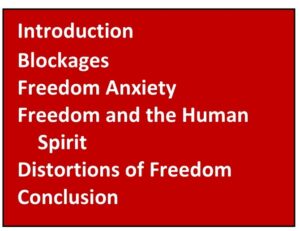
In this Letter we continue to explore the blockages to using our freedom. In past Letters we have defined freedom as having the opportunity to make a choice between alternative courses of action. We can use our freedom of choice when we have alternatives and the opportunity to take advantage of them by choosing. We said that we may not like a situation that we are in or the choices presented to us, but we always have a have a choice.
Interferences, distortions, negative influences, and blockages (blockages for short) make using our freedom to its fullest potential very challenging. We seek to eliminate and free ourselves from these blockages so to create the best life we can using our freedom. In this Letter we will also discuss what could be called freedom anxiety, the meaning of freedom to human beings, and distortions of freedom.
BLOCKAGES
Negativity. Negative beliefs, thinking, and feeling blinds us to seeing positive alternatives when we are deciding on choices. For example, the belief that “life is full of struggles” will direct us toward choosing alternatives that produce struggle. We may not even notice the positive in a situation and don’t have alternatives to weigh and choose from. You might choose fighting with your spouse rather than constructive communication. You put the two of you into a power struggle. 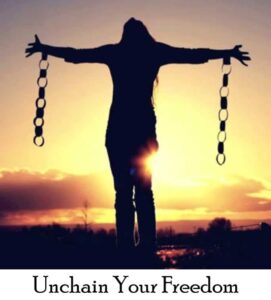
Negative feelings, like pessimism give rise to negative thoughts that block the perception of positive alternatives. For example, you might doubt the existence of medications that might help with your medical condition choosing to live with the pain rather than exploring a more beneficial approach. Identify and modify negative beliefs, thinking, and feelings.
Obsessions. Obsessions are frequent and persistent thoughts that we don’t want but can’t seem to change. Under the influence of obsessions we are not free to choose our thoughts. Without this freedom we will be stuck with what we have always had in the past because we won’t see alternatives. For example, “I am obsessed with the hurt I received from my last lover, always thinking about it. I am not free to see possible new lovers because the fear of getting hurt again blinds me and keeps me from pursuing new relationships.”
Compulsions. Compulsions are frequent and persistent behaviors that we don’t want but can’t seem to control. We become over focused on these behaviors and their consequences. We don’t notice alternative behaviors, having no choices, and therefore no freedom to deal effectively with situations that arise. For example, “As a compulsive talker I don’t know much about the people in my life because I don’t listen to what they say. I lack good information about these people so I can’t see different choices I may have about dealing with them.”
Addictions. Addictions are obsessions and compulsions combined together. We are always thinking about our addiction, seeking to satisfy it, and can’t stop behaving in this way. In addition, we develop physical cravings for something that we are addicted to. For example, we may think about food all the time, frequently overeat because we cannot stop eating, and have an irresistible physical craving for food.
Examples of obsessions, compulsions, and additions are food, drugs, sex, exercise, shopping, anger, power, money, hate, fear, hand washing, dieting, fighting, news watching, and technology (our cell phones in particular).
Point of Empowerment: Obsessions, compulsions, and addictions dominate us, determine our behavior, and steel our freedom. These activities diminish our life. When faced with the freedom of choice we automatically choose obsessive thoughts, compulsive behavior, and act to satisfy our addictions.
Practice: Identify and free yourself of obsessions, compulsions, and addictions.
Refusing responsibility. Refusal to take responsibility for our choices is refusing to own them. Ownership is a necessary attachment and a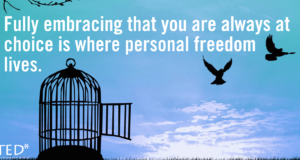 connection that makes us interested and causes us to pay attention. Without interest and paying attention we won’t see what our choices are or even know that we have choices. Not seeing and not knowing make freedom impossible. For example, “I have been shouting at my boss but when confronted with my behavior I deny it. I say, “No I did not shout.” I don’t own my behavior. Without owning this behavior, taking responsibility for it, I cannot see its destructive impact and discover that I have alternatives to shouting. I am refusing to learn assertive/effective behaviors.”
connection that makes us interested and causes us to pay attention. Without interest and paying attention we won’t see what our choices are or even know that we have choices. Not seeing and not knowing make freedom impossible. For example, “I have been shouting at my boss but when confronted with my behavior I deny it. I say, “No I did not shout.” I don’t own my behavior. Without owning this behavior, taking responsibility for it, I cannot see its destructive impact and discover that I have alternatives to shouting. I am refusing to learn assertive/effective behaviors.”
False responsibilities. False responsibilities are responsibilities that we take on but do not own, responsibilities that do not belong to us. For example, “My spouse is frequently angry and blames me for that anger saying that I am responsible. I believe this to be true and take on a false responsibility for the anger.” Taking on false responsibilities confuses us because while we take on the responsibility we also know, maybe unconsciously, that we are not responsible. In that confusion we are blind to what is possible and can’t see what our choices are. We can’t use our freedom and feel trapped. Freeing yourself from false responsibility increases your choices of how to respond to another person’s behavior and what to initiate by your own behavior. Free yourself from false responsibility.
Practice: For techniques and activities to free yourself of interferences, distortions, negative influences, and blockages please go to last month’s Letter, Lifelong Growth. [i]
FREEDOM ANXIETY
Freedom triggers feelings of anxiety. When we feel anxious we tend to avoid what makes us anxious therefore we avoid freedom. Freedom anxiety has two sources, change and chaos. Freedom gives us the opportunity to change, the freedom to change. We are often anxious about change because we don’t know what change will bring. We are uncertain about the future. This uncertainty can trigger anxiety.
There is chaos in freedom. Chaos is the opposite of order. It is unstructured, unruly, and uncontrollable. We tend to like structure, order, routine, and things we can control. Without these aspects of life we become anxious and fearful. Chaos scares us. Freedom can be chaotic because our choices can be chaotic. We then fear freedom and avoid it. Also, part of the inherent nature of freedom is chaos. We sense this and fear the chaos of freedom.
On the other hand. Chaos opens us to new possibilities and opportunities. For example, “I am a junior manager at my job. Senior managers frequently come and go creating a chaotic situation in leadership. I am becoming more experienced at my job. With this management chaos it is now possible for me to become a senior manager. An opportunity is opening up.”
FREDOM AND THE HUMAN SPIRIT, DISTORTIONS OF FREEDOM
We could say that freedom is an inherent part of the human spirit, that an aspect of the human spirit is freedom. If you don’t like the words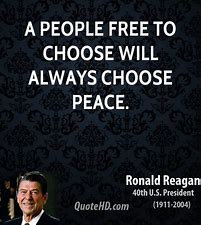 human spirit you could just say human being. Deprived of freedom the spirt/human being contracts and becomes less. The consequence for human beings as this happens is that we are diminished. We become less than we could be. And under certain circumstances we become drastically less that human. Cruelty and incredibly destructive behavior creep in and we inflict pain and suffering on others. A murderous rage can take hold of a person and this person feels justified in killing others. This person says, “I had no choice.” They do not experience being free but rather feel like they are in prison. A person with murderous rage has a certain kind of freedom, the freedom to do whatever he wants, whenever he wants to. This is freedom without responsibility, without accountability for the consequences of one’s actions and is totally destructive. Freedom without responsibility is a false freedom.
human spirit you could just say human being. Deprived of freedom the spirt/human being contracts and becomes less. The consequence for human beings as this happens is that we are diminished. We become less than we could be. And under certain circumstances we become drastically less that human. Cruelty and incredibly destructive behavior creep in and we inflict pain and suffering on others. A murderous rage can take hold of a person and this person feels justified in killing others. This person says, “I had no choice.” They do not experience being free but rather feel like they are in prison. A person with murderous rage has a certain kind of freedom, the freedom to do whatever he wants, whenever he wants to. This is freedom without responsibility, without accountability for the consequences of one’s actions and is totally destructive. Freedom without responsibility is a false freedom.
When freedom is denied from individuals, groups, communities, and countries, there is cruelty and destructiveness. Pain is inflicted by those restricting the freedom of others. This can be clearly seen in countries where freedom is restricted. These governments impose incredible hardship and suffering on their citizens and sometimes on the people of other countries.
Our values, what we give importance to by valuing, are timeless or temporal. Timeless values always exist independent of a historical period. Timeless values inspire us to follow the ideals that reflect the best that human beings can be. Temporal values are what we value now, at this time. Temporal values are of great importance because they guide our thinking, feeling, and acting. But because they are created and used by human beings temporal values can be distorted due to what can be called distortions and disturbances of the self. (See The Operating Manual for the Self for a full discussion of distortions of the Self.)
Freedom can be a timeless value or a temporal value. As a timeless value freedom triggers the use of other timeless values like justice, beauty, wisdom, compassion, kindness, caring, or love. If we don’t want, use, and value freedom we tend to lose track of other timeless values. Acting on one timeless value brings other timeless values into focus because they are interrelated, one leading and moving into another. If freedom is blocked, “can’t move,” movement among the other timeless values is stopped. If we are not free to choose, we are not free to choose to love or not, or to care or not, for example. Without choice it is meaningless to say “I love” or “I care” because loving/not loving, or caring/not caring exist together. Being able to choose not loving or not caring makes loving and caring more impactful, meaningful, and richer. Consider these analogies. A fish cannot appreciate the water because it has never been on dry land. Eating sweets all the time gets boring unless you eat something sour. We need have the freedom to choose contrasting experiences to know all that life has to offer.
True and false freedom, distortions of freedom. We could call the ideal of freedom true freedom. It is freedom that includes personal responsibility, being held accountable for the consequence of our actions. We could call freedom without responsibility false freedom, a distorted form of temporal freedom. Another distortion of freedom is the attitude that says, “I want to do whatever I want whenever I want it.” This is the attitude of a small child. If this attitude is brought into adulthood it represents a disturbance of self because it results in destructive behavior and painful consequences. When this attitude is combined with the denial of responsibility for one’s behavior the results are often devastating.
Point of Empowerment: True freedom is freedom as an ideal, a timeless value. Limited freedom is freedom with blockages. False freedom is freedom without personal responsibility.
All the blockages to freedom are things that we create ourselves. No one imposes them on us. This is good news as we can then free ourselves of these blockages. Whether we consciously with awareness create these blockages or create them unconsciously, without awareness, is important but secondary to the idea that we create them.
Point of Empowerment: The challenges we face in our life are also the issues we have about freedom.
Point of Empowerment: We often explore freedom by first enslaving ourselves. Then when we are free we fully experience it and its joy.
Without freedom there is no personal growth. In order to grow we need to have choices and to experience the consequences of our choices. We learn what works and what does not work in order to have the life we want. No freedom, no choice, no growth.
CONCLUSION
In this Letter we defined freedom, described the blockages to our use of our freedom, considered freedom anxiety, distortions of freedom, and explored what freedom means to the human spirit. Today there is conflict around the world about freedom, to have it or not. The extent of this conflict shows how important freedom is. There is also disagreement and sometime intense conflict regarding the limits to personal freedom, the freedom to do whatever you want, whenever you want. Freedom is a crucial aspect of our life that can be utilized for great benefit. Or we can diminish the importance of freedom pretending that it does not exist. But freedom is part of life, we cannot deny it or escaped from it for very long.
[i] April 2022 Letter | International Institute for Self Development (iifsd.org)
